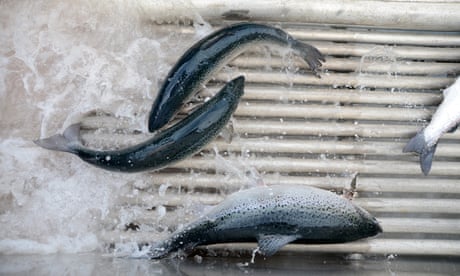- by foxnews
- 08 Apr 2025
Calls for independent salmon testing after lab tests allegedly show higher fat content than industry figures
Calls for independent salmon testing after lab tests allegedly show higher fat content than industry figures
- by theguardian
- 15 Dec 2021
- in news

The Tasmanian salmon industry is facing calls for independent nutritional testing after an analysis by activist groups found far more fat in farmed fish than wild-caught salmon and industry-reported figures.
Environment groups concerned about the impact of salmon farming bought two salmon fillets from a Coles supermarket, an IGA supermarket and a fishmonger in Melbourne to have them tested.
The results suggested farmed salmon has higher total saturated and trans fats than figures available for each of the three Tasmanian salmon companies and those known for wild-caught salmon.
Of the three farmed salmon companies, Tassal is the only company to publish nutritional information directly on its website. It says that its fish contain 16.1g total fats and 3.1g saturated fats per 100g.
Similar data was not readily available for Huon Aquaculture and Petuna but independent nutrition website MyNetDiary lists the total fat content of fresh fillets of Huon salmon per 100g as 17.9g with 3.5g of saturated fat. Total fats for Petuna salmon were 12g with 3g of saturated fat per 100g.
Wild caught salmon, by comparison, contains total fats of 6.3g and 1g of saturated fat per 100g, due to the difference in diet and habitat the fish were raised in.
A spokesperson for the Tasmanian Salmonid Growers Association dismissed the results citing in a statement the small sample size and variations in fat levels in fish between seasons.
They also rejected calls for independent testing, saying the industry already complied with all existing regulations set by Food Standards Australia New Zealand.
Michael Skilton, a professor of nutrition and cardio-metabolic health, was given the chance to review the results and said that it raised questions that should be investigated further.
Skilton said the testing showed that healthy omega-3 fats had increased, as had fats overall. He also said the saturated fat levels should be a focus as they can have an effect on cholesterol levels and is a major risk factor for heart disease.
- by foxnews
- descember 09, 2016
Ancient settlement reveals remains of 1,800-year-old dog, baffling experts: 'Preserved quite well'
Archaeologists have recently unearthed the remarkably well-preserved remains of a dog from ancient Rome, shedding light on the widespread practice of ritual sacrifice in antiquity.
read more


